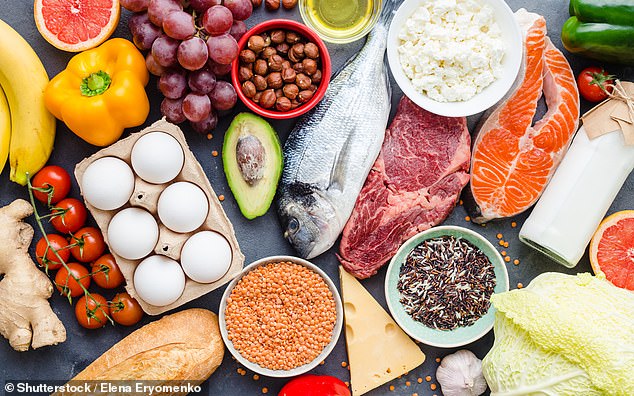Ditching meat for a just a few months could help you lose almost a pound a week, shock new research has suggested.
US scientists found that overweight adults who went vegan for roughly four months were just over 13lbs (6kg) lighter by the end of the study.
They credited the slimming effect to plant-based diets—those devoid of meat, dairy and eggs—producing less acid during digestion.
Researchers said the higher levels ‘dietary acid’ produced by animal products increased inflammation in the body.
This in turn disrupts the delicate internal processes in the body— like the metabolism and hormone production—contributing to weight gain, they explained.
Dr Hana Kahleova, an expert in nutrition from the Physicians Committee for Responsible Medicine in Washington and lead author of the new study, claimed the findings show the benefits of embracing veganism.
‘Replacing animal products with plant-based foods like leafy greens, berries, and legumes can help promote weight loss and create a healthy gut microbiome,’ she said.
In the study, 62 overweight adults were put on either a vegan-diet or the health-focused Mediterranean diet for 16 weeks.

Experts found that overweight adults who went vegan for 16 weeks were just over 13lbs (6kg) lighter by the end of the study
The latter emphasises eating fresh vegetables, healthy fats such as those from olive oil and nuts and lean meats like fish and chicken.
Participants’ body weight was measured before and after the diet.
Then—after a four week break—the group did another 16 weeks on the other diet.
This allowed researchers to compare weight loss across the two diets using the same participants.
Scientists also compared the ‘dietary acid’ scores of the foods the participants consumed across the two diets.
At the study’s conclusion, the vegan diet saw participants lose an average of 13.2 lbs (6kg) in 16 weeks, roughly 13oz (375g) per week.
By contrast, those on the Mediterranean diet didn’t experience any significant weight loss, the authors said.
Writing in the journal the Frontiers in Nutrition, they recommended dieters looking to slim down to incorporate more fruit, vegetables and grains that counteract dietary acid— a process called alkalising—into their diet.
The team specifically highlighted vegetables like leafy greens, broccoli, beets, asparagus, garlic, carrots, and cabbage.
For fruits, they recommended berries, apples, cherries, apricots, or melons.
Researchers also said legumes like lentils, chickpeas, peas, beans, soy products such as tofu and alternative grains like quinoa or millet could also have this effect.
While Britons have been told for years to up their intake of fresh fruit and vegetables and cut down of fatty cuts and processed meats for their health, there are some health hazards to going completely vegan.
Nutritionists have previously warned that vegans can miss out on a range of key vitamins and minerals by shunning animal products.
These include a lack of vitamin B12, which is in found milk and eggs, which can lead to fatigue or tiredness and negatively impact mental health.
Vitamin D is another nutrient found mainly in animal products, like oily fish, that those on vegan diets can be deficient in.
A vitamin D deficiency can lead to issues with bone development and cause pain.
A lack of iron, found in red meat and liver, can also lead to anaemia, causing people to feel tired and have heart palpitations.
Iodine, mainly found in seafood, is another nutrient known to be lacking in vegan diets and is important in maintaining a health metabolism.
While plant-based diets can include all of these mentioned nutrients, vegans need to carefully manage what they eat, or take supplements, to ensure they get enough.
There have also been concerns about the potential health impacts of fake ‘meats’ in vegan diets.
Last year, British experts found those who ate plant-based versions of sausages, burgers and mince seemingly had worse blood pressure than their meat-consuming counterparts
Another recent UK study revealed that opting for ultra-processed plant foods, like vegan sausages and burgers, as well as cakes and crisps, was linked to a 15 per cent higher risk of suffering heart attacks and strokes.
Interest in a plant-based diet has soared in recent years, with vegans citing ethical, environmental or health reasons.
The exact numbers of vegans now in the UK is almost impossible to establish.
But one recent survey suggested around 600,000 people are believed to be on a plant-based diet.
In England, one in four adults are now obese, while just over three in five are overweight.
However, four out of five adults are either overweight or obese in some areas of the country.
The NHS recommends that those overweight wanting to lose weight focus on consuming fewer calories overall and eating more healthily while upping the amount of weekly exercise.
The health service cautions that using what it dubs ‘fad diets’ may lead to short term weight loss this is rarely sustainable.












